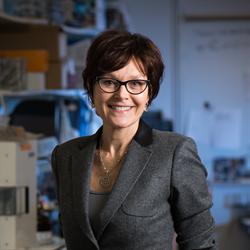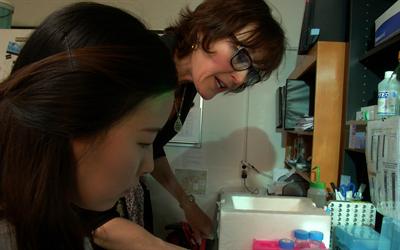Maquat Receives Lifetime Achievement Award in Science from International RNA Society

Lynne E. Maquat, Ph.D. has spent her career unraveling what happens in our cells during disease, making seminal contributions to our understanding of RNA’s role in sickness and in health. She’s also committed countless hours to mentoring the next generation of researchers and advocating for young women in the sciences. For these exceptional efforts, she’s receiving the 2017 Lifetime Achievement Award in Science from the international RNA Society.
The J. Lowell Orbison Endowed Chair and Professor in the Department of Biochemistry and Biophysics at the University of Rochester School of Medicine and Dentistry, Maquat began her professional career studying inherited anemias. She discovered a quality control process that blocks the creation of toxic proteins that cause disease. Known as nonsense-mediated mRNA decay or NMD, this process plays a part in one third of all inherited diseases, such as cystic fibrosis and muscular dystrophy, and one third of all acquired diseases, including a number of cancers.
“This award recognizes Lynne’s pioneering contributions to understanding the mechanisms of RNA, as well as her outstanding leadership, support and commitment to our field, including her role as a model for new generations of scientists,” said Juan Valcarcel Juarez, current president of the RNA Society, who works at the Centre for Genomic Regulation in Barcelona, Spain.

James McSwiggen, CEO of the RNA Society, added, “I can’t imagine a more appropriate choice of awardee.”
Maquat, the founding director of the University of Rochester’s Center for RNA Biology: From Genome to Therapeutics, will accept the award at the Society’s 22nd annual meeting in Prague in June.
The National Institutes of Health has continuously funded Maquat’s research for the past 34 years. She’s published more than 150 papers and reviews and one of her projects recently received an NIH MERIT award, a highly coveted type of grant that provides long-term, stable support to investigators whose research skills and productivity are distinctly superior, as judged by their peers and leaders at NIH.
“Lynne’s work has uncovered totally new avenues of cellular regulation that are relevant to the function of normal genes, as well as genes involved in numerous inherited and acquired diseases, and she is now leveraging these discoveries toward transformative therapies that firmly place RNA in the realm of personalized medicine,” said Jeffrey J. Hayes, Ph.D., the Shohei Koide Professor and Chair of the Department of Biochemistry and Biophysics at the University of Rochester School of Medicine and Dentistry.
Maquat has worked tirelessly helping women overcome obstacles in scientific careers and has mentored more than 50 students and postdoctoral fellows in her lab, many of whom now direct their own research lab in academics. She founded the University of Rochester Graduate Women in Science program in 2003 to address the “leaky pipeline” in science, which describes how fewer women than men who earn a Ph.D. degree in science go on to use that degree in a career.
In 2010, Maquat received the RNA Society’s Lifetime Achievement Award in Service. The following year she was elected to the National Academies of Sciences, one of the highest honors possible for any scientist. She was the first individual from upstate New York to receive the prestigious Canada International Gairdner Award, the country’s top award for excellence in biomedical research, which she won in 2015.
Maquat joined the University of Rochester Medical Center in 2000 after 18 years at the Roswell Park Cancer Institute. She has been a member of the RNA Society since its formation in 1993, and has played an extremely active role, holding every elective office from director, to secretary/treasurer, to president.
The RNA Society was formed to encourage the sharing of experimental results and emerging concepts in RNA research. With more than 1,000 members, it aims to promote research in developmental biology, evolutionary biology, biochemistry, biomedical sciences, chemistry, genetics and virology as they relate to questions of RNA structure and function.
# # #
The University of Rochester Medical Center is home to approximately 3,000 individuals who conduct research on everything from cancer and heart disease to Parkinson’s, pandemic influenza and autism. Spread across many centers, institutes and labs, our scientists have developed therapies that have improved human health locally, in the region and across the globe. To learn more, visit www.urmc.rochester.edu/research.


